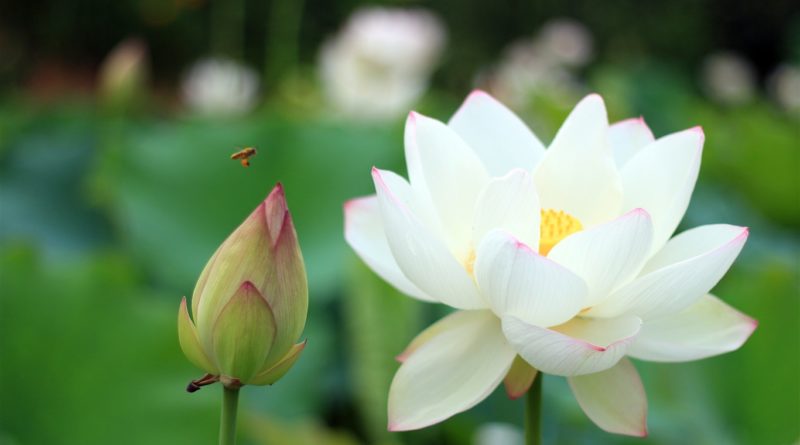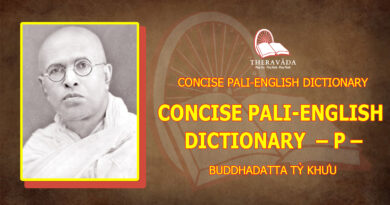Pāli Primer – Lesson 2
Lesson 2
VOCABULARY
1. Masculine nouns ending in -a
| dhamma | the doctrine, truth |
| bhatta | rice |
| odana | cooked rice |
| gāma | village |
| suriya | sun |
| canda | moon |
| kukkura / sunakha / soṇa | dog |
| vihāra | monastery |
| patta | bowl |
| āvāṭa | pit |
| pabbata | mountain |
| yācaka | beggar |
| sigāla | jackal |
| rukkha | tree |
Verbs
| harati | carries, take away |
| āharati | brings |
| āruhati | climbs, ascends |
| oruhati | descends |
| yācati | begs |
| khaṇati | digs |
| vijjhati | shoots |
| paharati | hits, strikes |
| rakkhati | protects |
| vandati | worships, salutes |
2. Declension of masculine nouns ending in -a (contd.)
Accusative case: The case ending -ṃ is added to the nominal base to form the accusative singular number. The case ending -e is added to the nominal base to form the accusative case plural number. A noun thus inflected is used as the object of a sentence. The goal of motion is also expressed by the accusative case.
Singular:
1. nara + ṃ = naraṃ
2. mātula + ṃ = mātulaṃ
3. kassaka + ṃ = kassakaṃ
Plural:
nara + e = nare
mātula + e = mātule
kassaka + e = kassake
3. Examples in sentence formation
Singular:
1. Putto naraṃ passati – The son sees the man.
2. Brāhmaṇo mātulaṃ rakkhati -The brahmin protects the uncle.
3. Vāṇijo kassakaṃ paharati – The merchant hits the farmer.
Plural:
1. Puttā nare passanti – Sons see men.
2. Brāhmaṇā mātule rakkhanti – Brahmins protect uncles.
3. Vāṇijā kassake paharanti – Merchants hit farmers.
Exercise 2
4. Translate into English:
1. Tathāgato dhammaṃ bhāsati.
2. Brāhmaṇā odanaṃ bhuñjanti.
3. Manusso suriyaṃ passati.
4. Kumārā sigāle paharanti.
5. Yācakā bhattaṃ yācanti.
6. Kassakā āvāṭe khaṇanti.
7. Mitto gāmaṃ āgacchati.
8. Bhūpālo manusse rakkhati.
9. Puttā pabbataṃ gacchanti.
10. Kumāro Buddhaṃ vandati.
11. Vāṇijā patte āharanti.
12. Puriso vihāraṃ gacchati.
13. Kukkurā pabbataṃ dhāvanti.
14. Sigālā gāmaṃ āgacchanti.
15. Brāhmaṇā sahāyake āharanti.
16. Bhūpālā sugataṃ vandanti.
17. Yācakā sayanti.
18. Mittā sunakhe haranti.
19. Putto candaṃ passati.
20. Kassako gāmaṃ dhāvati.
21. Vāṇijā rukkhe chindanti.
22. Naro sigālaṃ vijjhati.
23. Kumāro odanaṃ bhuñjati.
24. Yācako soṇaṃ paharati.
25. Sahāyakā pabbate āruhanti.
5. Translate into Pāli:
1. Men go to the monastery.
2. Farmers climb mountains.
3. The brahmin eats rice.
4. The Buddha sees the boys.
5. Uncles take away bowls.
6. The son protects the dog.
7. The king worships the Buddha.
8. The merchant brings a boy.
9. Friends salute the brahmin.
10. Beggars beg rice.
11. Merchants shoot jackals.
12. Boys climb the mountain.
13. The farmer runs to the village.
14. The merchant cooks rice.
15. Sons worship the uncle.
16. Kings protect men.
17. The Buddha comes to the monastery.
18. The men descend.
19. Farmers dig pits.
20. The merchant runs.
21. The dog sees the moon.
22. Boys climb trees.
23. The brahmin brings the bowl.
24. The beggar sleeps.
25. The king sees the Buddha.
-ooOoo-









